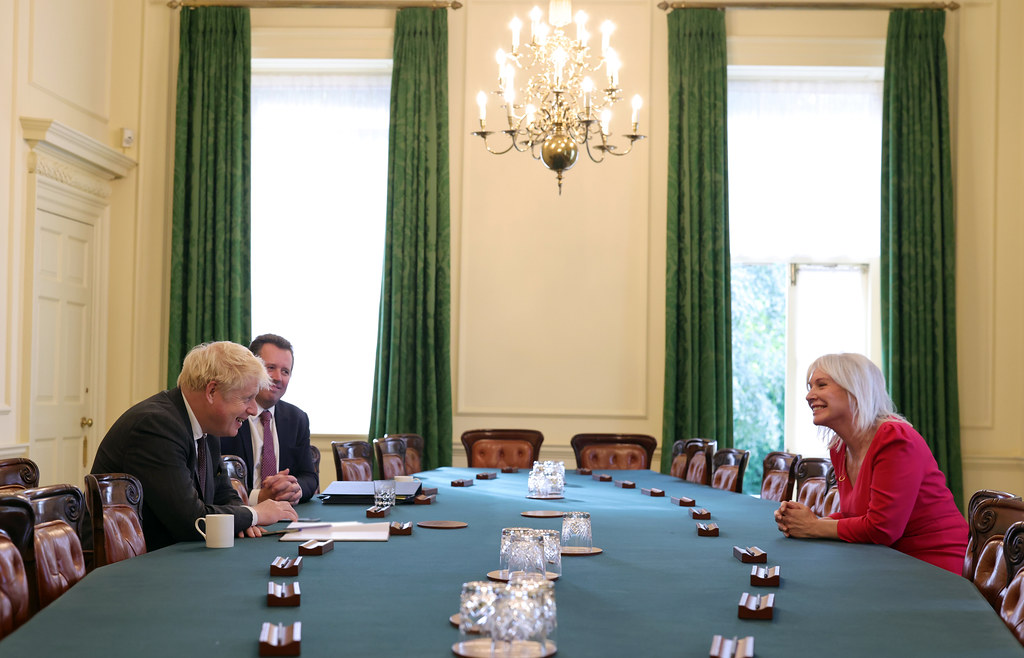Britain’s media and the rule of law crisis: hostility to scrutiny has been normalised
The UK’s authoritarian drift is painfully apparent in the government’s approach to media freedom.

For viewers of ITN’s Channel 4 News, BBC Newsnight, or even at one stage ITV’s more populist-inclined breakfast show, Good Morning Britain, the following words have become a normal feature of reportage during the Boris Johnson years: “We invited a member of the government on to the programme, but no one was available”.
Under Johnson’s leadership, no. 10 has repeatedly used the tactic of boycotts to bully and cajole independent media reporting and scrutiny. Refusing to provide television and radio interviews to large mainstream media organisations attacks the cultural aspect of a democracy, inhibiting the capacity of citizens to scrutinise policy.
Despite the presence of a number of journalists in the media establishment with known Conservative Party links and sympathies, the government frequently present the industry as inherently liberal and hostile to their vision for Britain. This victim complex has led them to the dangerous conviction that they are undertaking a moral crusade against out of control “woke” thinking that they argue runs counter to the views of ordinary Britons.
Worrying signs for media freedom
There have been several recent signs of this playing out. Julian Knight, the Conservative MP who chairs the Digital, Culture, Media and Sport Committee, showed a worrying lack of understanding of (or disregard for) the BBC’s political neutrality, when he said that the exit of Laura Kuenssberg from the position of political editor was an opportunity to hire someone “much more pro-Brexit”. Johnson’s new Culture Secretary, Nadine Dorries, also announced her arrival in the post by denouncing an alleged culture of “left-wing snobbery” in Britain’s media.
Dorries has since followed this up by attacking Nick Robinson’s BBC interview with Boris Johnson (the first the Prime Minister has given to the Today programme in two years). Robinson is, ironically, well known for his Conservative views, having been the President of the Oxford University Conservative Association during his student days. After the interview, “friends of Dorries” (which is briefing-speak for what are normally members of a politician’s staff team) told the Sunday Times that “Nick Robinson has cost the BBC a lot of money.” So, in short, the government launched a completely inappropriate political intervention into negotiations over the license fee.
Yet, perhaps most concerning of all, is the partisan approach they have taken to the selection of the next chair of the media regulator, Ofcom. The government has been angling for the appointment of Paul Dacre, the former editor of the right-wing Daily Mail, who for over a quarter of a century was responsible for some of the most infamous front pages in British media history. Under his leadership, the paper was banned as a source from Wikipedia, due to its ‘unreliability’. The German magazine Der Spiegel once accurately described its ideology as, “Immigration is evil, social welfare is evil, working women are evil, Europe is evil, aid is evil, [and] the BBC is evil.” In one of its more recent outrages (which was after Dacre left as editor), the newspaper paid £25,000 in compensation to the Cambridge University academic, professor Priyamvada Gopal, after falsely accusing her of inciting a race war.
Dacre was previously all set to be appointed as chair, but is reported to have flunked the interview. Rather than giving the job to another candidate, the government has restarted the process from scratch and provided the former Daily Mail editor with the opportunity to apply again.
Given his record at the Mail, and against a backdrop of government attacks on media scrutiny, you could scarcely imagine a worse appointment as chair of the media regulator.
November 3, 2021
Brexit Spotlight is run by Another Europe Is Possible. You can support this work by joining us today. The website is a resource to encourage debate and discussion. Published opinions do not necessarily represent those of Another Europe.





